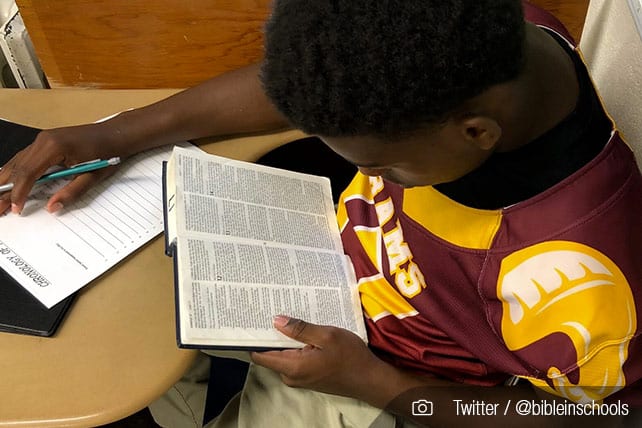Is it back to the Bible time? Following this spring’s wave of state legislation regarding Bible literacy electives, some students heading back to public school classrooms this fall will learn about the Bible’s history, literature, and values.
Missouri and Alabama are among the states that now have carefully crafted laws allowing schools to offer such courses. Although bills in some states failed, the overall trend is to follow the lead of Kentucky, where the governor signed a Bible literacy bill into law in 2017.
Groups such as the Congressional Prayer Caucus Foundation helped lawmakers in several states draft legislation through Project Blitz. In January, President Trump tweeted about the flurry of activity: “Numerous states introducing Bible Literacy classes, giving students the option of studying the Bible. Starting to make a turn back? Great!”
Chuck Stetson, founder of the Bible Literacy Project, says the movement definitely has momentum. “We’re not too far away from a tipping point,” he says. “Instead of having to find a reason to teach the Bible in public schools academically, as part of a good education, you’re going to have to find a reason not to do it.”
Back to the Bible in Schools: “This isn’t a religion class”
In Missouri, public schools are now encouraged—but not required—to offer Bible electives. Ben Baker, the representative who sponsored that state’s bill, says, “In America, no root runs deeper than the Bible.” It’s “simply a part of the fabric of life.”
Ed Emery, the bill’s sponsor in Missouri’s senate, says, “A lot of our teachers today have been raised in this era where they were told it was illegal to have the language of the Bible in schools, which is absolutely not true.”
Alabama’s legislation and guidelines surrounding it are so new that few classes are in place for this fall. But superintendents say they’re gauging interest and figuring out what to offer and how. Russ Tate, curriculum director for Tuscumbia, says if enough students are interested, “We’ll do everything we can to make [Bible electives] happen in the future.” Core classes for graduation remain the top priority, he notes, but “we’re open to this class offering.”
Tate envisions the elective falling under the English category, while other districts align it with social studies. “This isn’t a religion class,” he says, “but using the Bible as literature.”
Keith Davis, another Alabama superintendent, says Bible electives will likely be available for the 2020-2021 school year. “This course provides the historical basis for something most of these kids have at least been exposed to,” he says. “Anything with a strong moral foundation is good. It’s good for the kids to understand the culture in which they live.”
Schools in Florence, Alabama, had time to set up a Bible class, but Superintendent Jimmy Shaw says they’re waiting to see if enough kids sign up. “We appreciate the option of being able to offer it, but we’ll just let the students decide if they want to take the course,” he says. “It wasn’t a major issue for us.”
Allison Flanagan, a junior in Morgan County, Alabama, says she’s looking forward to the new Survey of the Bible course being offered at her high school and four others. “I’m excited to learn more about the history of [the Bible],” she says, because “that’s not something I get a lot of at church.” Created in conjunction with Piedmont International University, the online elective also provides college credit for students who pass it.
Dexter Rutherford, who has worked in both religious and public schools, says, “I don’t think you can ever do too much to expose children to spiritual values. The schools need to reinforce values, though naturally a specific religious belief would have to be avoided.” He adds that Bible electives aren’t about indoctrination but about “teaching the history and values that bode well for life, such as service to others and that’s always a good thing.”












